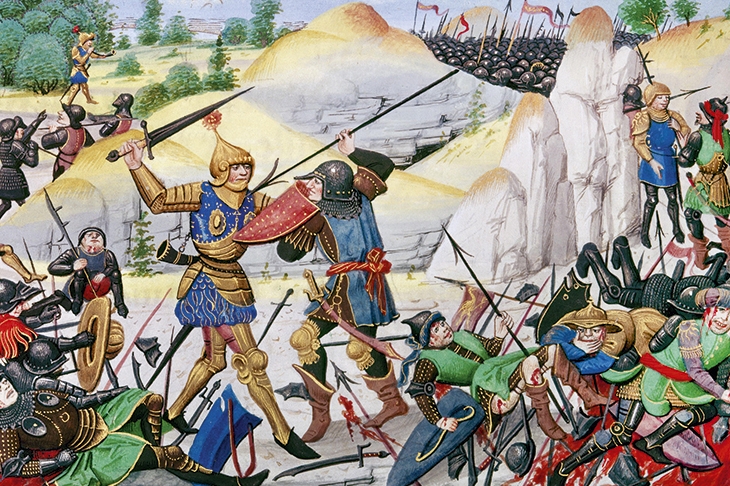Six remarkable stories shape this book. Tracing the trajectories of the Odyssey to the Icelandic Njals Saga, via the Kosovo Cycle of heroic poems, the French Chanson de Roland, the German Nibelunglied and our own home-grown epic Beowulf, Nicholas Jubber’s new work is at once a travel journal, a meditation on the idea — and ideal — of Europe, and an exploration of a pivotal moment in the author’s own past. Following the 2016 referendum, Jubber sets off to the Greek island of Chios, perhaps Homer’s birthplace, and now at the front line of the Mediterranean migrant crisis. After a month volunteering in a refugee camp he works his way west and northwards until he comes to rest on the turf roof of a farmhouse in southern Iceland.
The prose is colourful and vigorous; landscape is frequently described through dynamic verbs and unusual similes. So in Serbia: ‘Fast-moving streams played glissandos on the shallow beds, and precipitous meadows dangled above us, like rags pinned to the sky by their sheep.’ Jubber’s advance from John Murray can’t have been over-generous; he sleeps rough, on trains and in doorways, hoarding his resources like the migrants whose paths so often intersect with his own.
Interwoven with the usual adventures of travel — late-night drinking in smoke-filled bars, quirky conversations, semi-comic mishaps and often terrible weather — is a more profound meditation — indeed much direct reportage — on contemporary and historical ideas of European identity, the notion of homeland and that shining promise of a better life that our continent seems to extend to its neighbours.
The six epics spark Jubber’s imagination in different ways. The Odyssey triggers thoughts about the bonds between fathers and sons and the loss of his own father. The Kosovo Cycle, least known of the six perhaps, is embedded in a series of encounters with Kosovans, Serbs and Bosnians, each of whom has their own disquieting story to tell about the ways in which, 20 years after the last Balkan war, the 14th-century battle of Kosovo Field still resonates with nationalist aspirations and anxieties.
Great epics do not simply relate past stories, but rather, disturbingly, continue to give shape to dangerously powerful emotions. Reminding us of Islam’s long history in Europe, both the Kosovan poems and the Chanson de Roland feature invading Muslim enemies; the Christians respond with treacherous infiltration of the enemy camp and suicidal last stands.
After the macho posturing of these two poems, the Nibelunglied offers relief — of a kind. Jubber focuses on Queen Kriemhilt, whose dramatic clash with Queen Brünhilt over social precedence culminates in a bloodbath in which she takes a shockingly active role. Then it’s on to Britain — a little awkwardly, since Beowulf is set entirely in Scandinavia. Jubber’s adventures on home turf try to localise the poem’s place of origin, in midland Mercia or the fen fastnesses of East Anglia. Next, he takes ship for Denmark, to the reconstructed royal hall that the monster Grendel sought to destroy. By the time he reaches Iceland, sailing on the notorious Faroese ferry, the Smyril, autumn has definitively arrived. Weather and mood have turned.
Iceland’s geothermal landscapes are strikingly described, but Jubber himself runs somewhat out of steam here. As he admits, Njáls Saga, wonderful though it is, isn’t really an epic, but rather a tale of local politics and southern Icelandic sheep farmers. The translation cited is 150 years old, yielding some unfamiliar character names and archaic dialogue; contemporary Icelanders’ names too are often mangled.
Nevertheless, these chapters not only recount the highlights of two of the most important sagas — Laxdæla Saga has an intertextual connection with the Nibelungenlied story, but as a bonus, they also consider the Poetic Edda, the great anthology of mythological and heroic poetry written down in Iceland around 1270 and which has a better claim to engagement with epic themes.
Jubber heads to the remote north-east to visit the island’s newest literary monument, the Arctic Henge, still under construction. This huge stone circle records the long list of dwarf-names that appears in the Edda’s very first poem, ‘The Seeress’s Prophecy’. The Edda also offers its own distinctive version of the heroic legends about Sigurðr the dragon-slayer and his fierce wife Guðrún, the Northern reflex of Kriemhilt. These refigure the Nibelungenlied material in a mode that is highly critical of the epic ideals of honour and vengeance, increasingly placed under pressure throughout the book. Iceland’s relative isolation from the European mainland may have safeguarded the Edda as a unique testament to our likely pre-Christian Germanic heritage, but it could not prevent the Nazis from harnessing these poems for propaganda, claiming them as a repository of ideal Aryan heroism.
From this bleak point, at the very edge of Europe, it’s time to turn for home. Jubber’s journeying has indeed been epic, in scale and in ambition. In this thoughtful travelogue he has woven together colourful ancient and modern threads into a European tapestry that combines the sombre and the sparkling.
Epic Continent: Adventures in the Great Stories of Europe
Author: Nicholas Jubber
Publisher: John Murray
Page count: 322
Price: £20





Comments